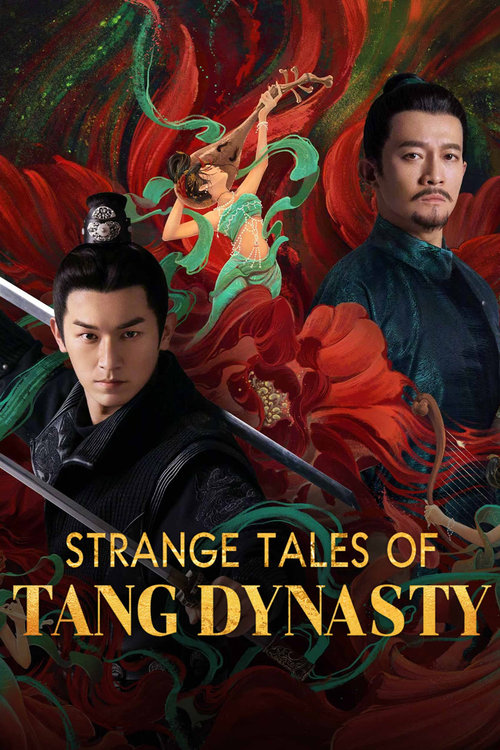
Ask Your Own Question
What is the plot?
In the "Season 1 Character Profiles: Viserys Targaryen," the episode begins by introducing Viserys Targaryen, the exiled prince of the Targaryen dynasty. He is portrayed as a man consumed by his desire to reclaim the Iron Throne, which he believes is his birthright. The episode highlights his deep-seated resentment towards those who have usurped his family's power, particularly the Baratheons. Viserys is shown to be arrogant and self-absorbed, often referring to himself as the rightful king.
The narrative then shifts to Viserys's relationship with his sister, Daenerys Targaryen. The episode details how Viserys has raised Daenerys in exile, treating her more as a pawn than a sister. He is depicted as domineering and abusive, often reminding her of their family's lost glory and the importance of her marriage to Khal Drogo, a powerful Dothraki warlord. Viserys's motivations are driven by his belief that marrying Daenerys to Drogo will provide him with an army to reclaim the throne.
As the story progresses, the episode illustrates the moment when Viserys and Daenerys arrive in the Dothraki Sea. Viserys is shown to be increasingly impatient and frustrated with the Dothraki culture, which he views as barbaric. He is desperate to assert his authority and often threatens Daenerys, believing that her marriage will elevate his status. The tension between the siblings is palpable, as Daenerys begins to assert her own identity, influenced by her new surroundings and the Dothraki way of life.
The episode also covers the pivotal moment when Daenerys is married to Khal Drogo. Viserys's reaction is one of anger and jealousy, as he feels that he is losing control over his sister and the situation. He is shown to be dismissive of Drogo, underestimating the Dothraki leader's power and influence. Viserys's arrogance leads him to believe that he can manipulate Drogo to his advantage, despite the cultural differences that separate them.
As Daenerys begins to adapt to her new life, the episode highlights Viserys's growing desperation. He becomes increasingly frustrated with Drogo's reluctance to support his claim to the throne. Viserys's internal conflict is evident as he grapples with his entitlement and the reality of his situation. He is portrayed as a man on the brink of losing everything, driven by a singular focus on power and revenge.
The climax of the episode occurs when Viserys confronts Drogo, demanding that he fulfill his promise to help him reclaim the Iron Throne. This confrontation is marked by tension and hostility, as Drogo's patience wears thin. Viserys's arrogance leads him to threaten Drogo, believing that his Targaryen lineage will intimidate the Dothraki leader. However, Drogo's response is swift and brutal, showcasing the consequences of Viserys's hubris.
The episode concludes with a powerful moment that encapsulates Viserys's downfall. After a series of escalating tensions, Drogo decides to teach Viserys a lesson about respect and power. In a shocking turn of events, Drogo humiliates Viserys, stripping him of his dignity and authority. This moment serves as a turning point for both Viserys and Daenerys, as it marks the beginning of Daenerys's transformation into a more assertive and independent character, while Viserys's fate becomes increasingly precarious. The episode ends with a sense of foreboding, as Viserys's obsession with the throne continues to cloud his judgment, setting the stage for future conflicts.
What is the ending?
In the episode "Season 1 Character Profiles: Viserys Targaryen," the focus is on the character of Viserys Targaryen, his motivations, and his relationships, particularly with his sister Daenerys. The episode does not have a traditional narrative ending, as it serves more as a character exploration rather than a plot-driven conclusion. However, it highlights Viserys's ambition and his ultimate fate in the broader context of the series.
Expanding on this, the episode begins with a portrayal of Viserys Targaryen, the exiled prince of the Targaryen dynasty. He is introduced as a character filled with a sense of entitlement and desperation, driven by the desire to reclaim the Iron Throne that he believes is rightfully his. The visuals depict him as a young man with the traditional Targaryen silver hair and a brooding demeanor, often dressed in regal but worn clothing that reflects his status as a displaced royal.
As the narrative unfolds, we see Viserys's relationship with his sister Daenerys, whom he views as a means to an end. He is emotionally cold and manipulative, treating her more as a pawn than a sibling. The episode captures moments of tension between them, showcasing Viserys's jealousy and anger towards Daenerys's growing bond with Khal Drogo, the Dothraki warlord. This relationship is pivotal, as it highlights Viserys's inability to see Daenerys as anything other than a tool for his ambitions.
The episode also delves into Viserys's interactions with other characters, such as Khal Drogo and the Dothraki. His arrogance and disdain for those he considers beneath him are evident, particularly in his confrontations with Drogo, where he demands respect and recognition. The visuals emphasize his frustration and the growing rift between his expectations and the reality of his situation.
As the episode progresses, it becomes clear that Viserys's motivations are rooted in a deep-seated fear of losing his identity and legacy. His obsession with the Iron Throne blinds him to the changing dynamics around him, particularly Daenerys's transformation from a timid girl into a strong and independent woman. This shift is illustrated through scenes where Daenerys begins to assert herself, contrasting sharply with Viserys's increasingly desperate and volatile behavior.
The climax of Viserys's arc is foreshadowed throughout the episode, culminating in a sense of impending doom for his character. His refusal to adapt and his reliance on outdated notions of power lead to his ultimate downfall. The episode concludes with a sense of foreboding, as viewers are left to ponder Viserys's fate in the larger narrative of "Game of Thrones."
In summary, while the episode does not provide a traditional ending, it effectively sets the stage for Viserys Targaryen's tragic trajectory, emphasizing themes of ambition, entitlement, and the consequences of underestimating others. The fate of Viserys, as established in the series, ultimately leads to his demise, serving as a cautionary tale about the dangers of unchecked ambition and the importance of recognizing the strength in those we may seek to control.
Is there a post-credit scene?
In the episode "Season 1 Character Profiles: Viserys Targaryen," there is no post-credit scene. The episode focuses on providing an in-depth look at the character of Viserys Targaryen, exploring his motivations, background, and relationships, particularly with his sister Daenerys. It delves into his obsession with reclaiming the Iron Throne and his sense of entitlement as the last surviving male Targaryen. The narrative highlights his arrogance, desperation, and the emotional turmoil he experiences as he navigates the complexities of his situation in exile. The episode concludes without any additional scenes or content beyond the character profile itself.
What motivates Viserys Targaryen's desire for the Iron Throne?
Viserys Targaryen is driven by a deep-seated need to reclaim his family's lost legacy and power. Having grown up in exile after the fall of his father's reign, he is consumed by a sense of entitlement to the Iron Throne, believing it is his birthright. His motivations are fueled by a mix of desperation, pride, and a desire for validation, as he often feels overshadowed by his sister Daenerys and their shared past.
How does Viserys Targaryen's relationship with Daenerys evolve throughout Season 1?
Viserys's relationship with Daenerys is fraught with tension and manipulation. Initially, he views her as a means to an end, using her marriage to Khal Drogo as a way to gain an army to reclaim the throne. As the season progresses, his treatment of her becomes increasingly abusive, revealing his deep-seated insecurities and jealousy. Daenerys's growing strength and independence ultimately lead to a rift between them, showcasing Viserys's inability to adapt to her transformation.
What are the key moments that highlight Viserys Targaryen's arrogance?
Viserys's arrogance is prominently displayed during several key moments, such as when he demands respect from Khal Drogo and his Dothraki followers, believing his royal lineage should command loyalty. His insistence on calling himself 'the rightful king' despite his lack of power and his dismissive attitude towards Daenerys's feelings and growth further illustrate his inflated sense of self-importance. These moments culminate in his underestimation of Daenerys's potential, leading to his eventual downfall.
How does Viserys Targaryen's character reflect the themes of power and entitlement in the series?
Viserys embodies the themes of power and entitlement through his relentless pursuit of the Iron Throne and his belief that his royal blood grants him the right to rule. His character serves as a cautionary tale about the dangers of entitlement, as he fails to recognize the shifting dynamics of power in Westeros. His arrogance blinds him to the realities of his situation, ultimately leading to his tragic end, which underscores the series' exploration of the corrupting nature of power.
What is the significance of Viserys Targaryen's interactions with other characters, such as Khal Drogo and Daenerys?
Viserys's interactions with Khal Drogo and Daenerys are significant as they reveal his character's flaws and the broader cultural tensions in the story. His condescending attitude towards Drogo highlights his ignorance of Dothraki culture and his inability to see Drogo as an equal. In contrast, his relationship with Daenerys showcases his manipulative nature, as he attempts to control her for his own gain. These interactions not only develop his character but also set the stage for the conflicts that arise as Daenerys begins to assert her own identity.
Is this family friendly?
The episode "Season 1 Character Profiles: Viserys Targaryen" from the Game of Thrones specials delves into the character of Viserys Targaryen, exploring his motivations and background. While it is primarily a character profile, there are several aspects that may be considered objectionable or upsetting for children or sensitive viewers:
-
Themes of Power and Ambition: Viserys's intense desire for power and his obsession with reclaiming the Iron Throne can be unsettling, as it showcases a ruthless pursuit of ambition.
-
Violence and Threats: The character's interactions often involve threats of violence and intimidation, reflecting a harsh and brutal world.
-
Family Dynamics: The portrayal of Viserys's relationship with his sister Daenerys is complex and can be uncomfortable, as it includes elements of control and manipulation.
-
Emotional Turmoil: Viserys experiences significant emotional distress, including feelings of inadequacy and jealousy, which may resonate negatively with sensitive viewers.
-
Dark Themes: The overall tone of the series includes dark and mature themes, which may not be suitable for younger audiences.
These elements contribute to a narrative that is more appropriate for mature viewers, given the emotional and psychological complexities involved.
























